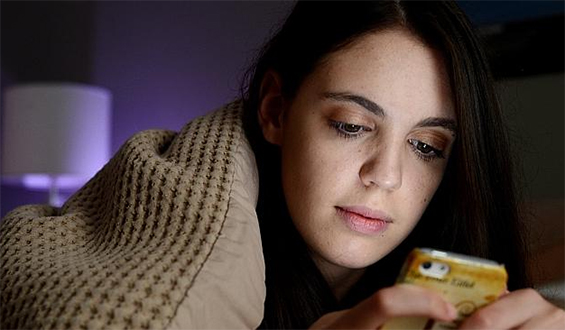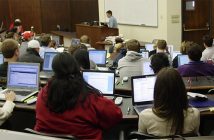
A new study suggests that texting late at night can negatively affect students’ sleep and school performance.
It’s an important topic — media use among minors is increasing drastically, according to a study by the American Academy of Pediatrics, with kids ages 8 to 18 using electronics for about seven and a half hours per day. Researchers are eager to find out what effect that might have on students’ lives.
The texting study focused on how post-bedtime messaging can affect sleep cycles, daytime sleepiness, and academic performance.
The survey-based research found that students who messaged friends for 30 minutes after they got in bed and turned out the lights did significantly worse in school than students who messaged for less than 30 minutes or not at all after bedtime. These more talkative students also slept for fewer total hours and were sleepier during the day, leading to a decrease in academic performance.
Texting friends before bedtime didn’t have an effect on academic performance, however, because it didn’t prevent sleep or cause daytime drowsiness in the classroom.
The study was published in the Journal of Child Neurology by Xue Ming, a professor of neuroscience at Rutgers New Jersey Medical School, reports Science Daily. She distributed surveys about sleep and texting habits to three high schools in New Jersey (one suburban and public, one urban and public, and one private) and received 1,537 responses, reports the Economic Times.
Girls reported spending more time messaging in total and were sleepier during the day, but still performed better academically than boys. Ming believes that this is probably because they texted before bedtime and not after, reports the Press Trust of India.
Part of the problem with texting after lights out is that screens emit bluish light, which can disrupt sleep rhythms by delaying the release of the sleep hormone melatonin. Programs exist that will make the light from computer screens more reddish and interfere less with melatonin, but the bright lights and the distracting alerts are still not hurdles to falling asleep.
Devon Andre of Bel Marra Health quoted Ming:
Rapid Eye Movement sleep is the period during sleep most important to learning, memory consolidation and social adjustment in adolescents. When falling asleep is delayed but rising time is not, REM sleep will be cut short, which can affect learning and memory.
Ming doesn’t advocate for the cessation of texting by teenagers altogether because she noted it can help students collaborate on projects, get help on tough subjects, and provide an emotional support system that teenagers desperately need.
She does, however, advocate for educators to build sleep education into their curricula to teach students the problems they might create by staying up to text. Students could benefit from learning about the REM sleep that they’re often missing out on and how to get the best night’s sleep possible to avoid daytime fatigue.
Ming also suggests that later start times for high schoolers may be beneficial to both their learning and their health because teenagers are biologically inclined to sleep in and go to bed later than people of other age groups.




